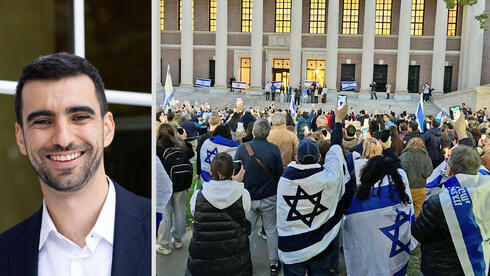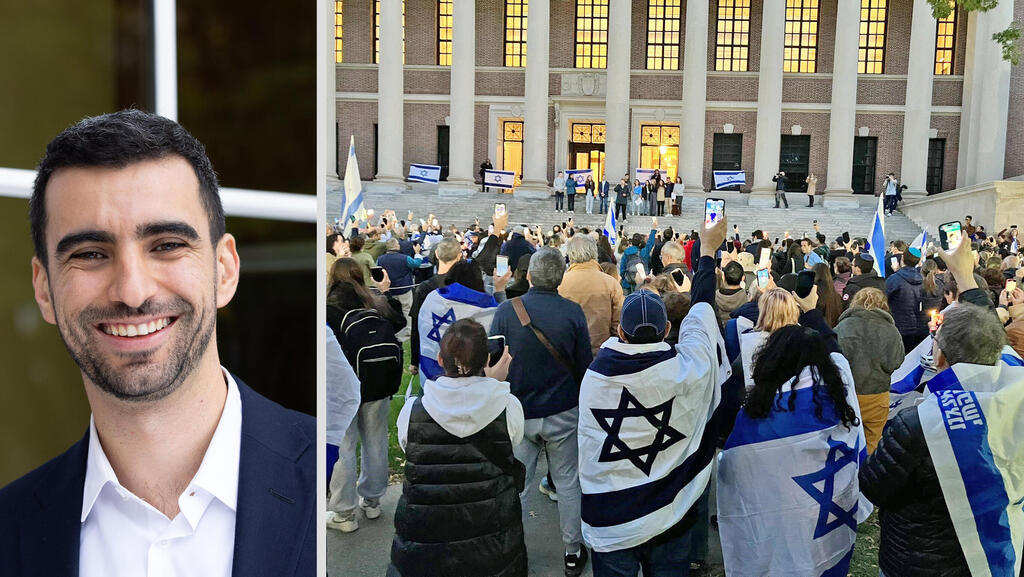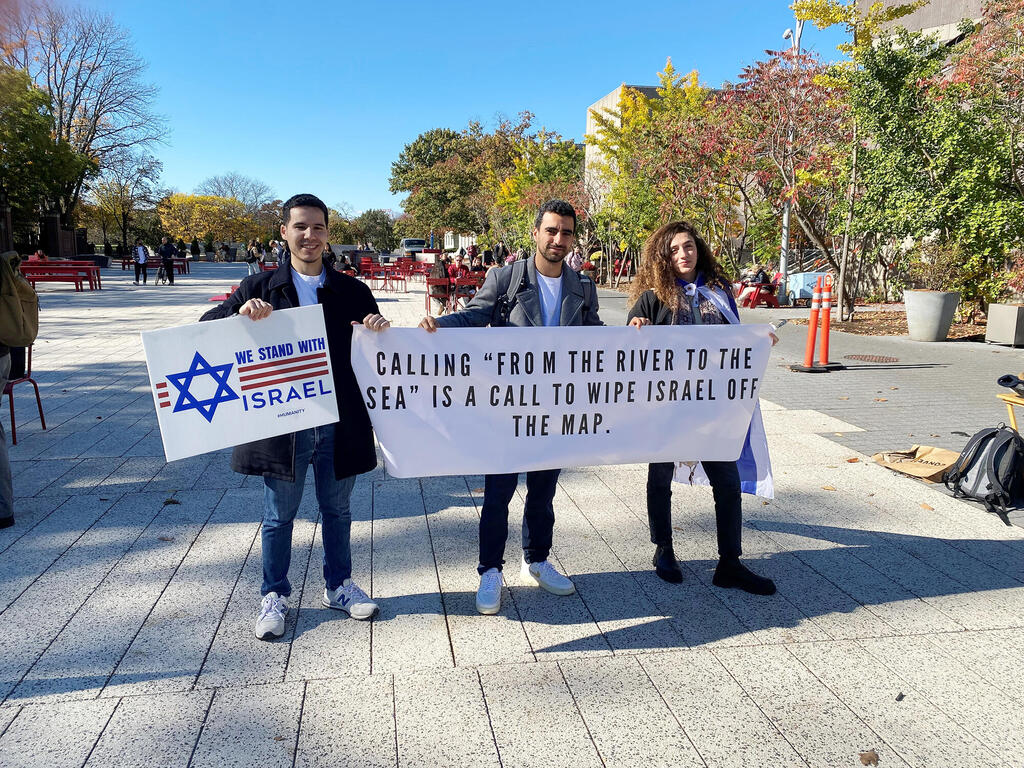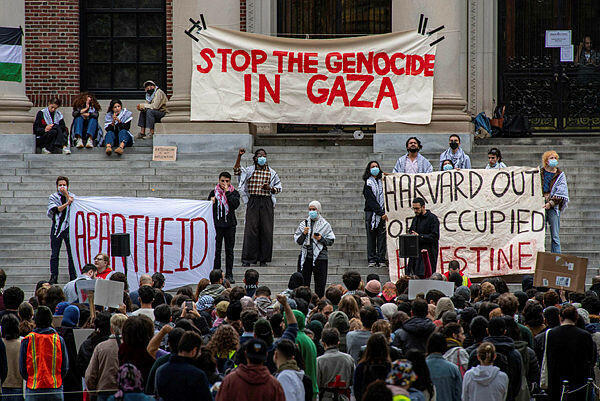
"Harvard realizes it has a serious anti-Semitism problem. You'd have to be blind not to see it"
With anti-Israeli demonstrations being held across campuses in the U.S., Nimrod Ravid, a student at Harvard, is working to raise awareness of the atrocities committed by Hamas by founding the survived.to.tell page on Instagram, which shares video clips of the survivors of the massacre and the families of the abductees
"On the first day of the war I woke up in Boston and realized at that moment what a disaster had occurred. I was an officer in the IDF Spokesperson’s Unit, I called a former colleague and said to her, 'This is crazy, my feed in Israel is full of horror stories all about the Nova music festival, etc. and there is nothing going on here, everything is as usual.' Moreover, among university students you encounter manifestations of support for the attacks of October 7. There was nothing for me to share in English. It was total frustration," says Nimrod Ravid (27), an Israeli student of economics and computers at Harvard University.
Ravid decided to set up an Instagram page named survived.to.tell on which he uploads videos with human stories of the survivors of the October 7 Nova music festival and the families of the abductees
"On Sunday, me and Meirav Barel, who worked with me in the Spokesperson’s Unit and who works at the Israel-is association, which connects young Israelis and their peers worldwide. On the first day, we didn't have any stories or testimonies yet, but I felt that if I brought the first three, people would understand the concept and it would start running," explained Ravid.
Ravid is the son of a high-tech father and a law professor mother. His brother is an officer in the IDF’s Unit 8200 and his sister is completing her officers' course in the Education Corps. Nimrod, currently in his third-year as a Harvard student, is living in the university dormitories in Cambridge, Massachusetts. "I was happy to get some distance from my previous chapter in life, I am a student, working at a VC fund in the field of digital health, but when October 7 happened, it thrust me back into my military job as an officer in the IDF Spokesperson’s Unit. I recruited myself into the reserves remotely, and I hardly study because I am fighting. This is the least I can do to change the way this university is run," he told Calcalist.
What do we in Israel not understand about the American mentality?
"When Americans see blood and gunshots or aggressive footage - they just move on and don't look at it. As soon as you come to American students with an agenda in advance - they stop listening. They like the power of the story, this is the only angle that conveys to them the difficulty we are experiencing here. We understood that there was a massacre here, and it should be framed by survivors, like in the Holocaust. I contacted survivors from the Nova festival and we started uploading the evidence to our page. Then we moved to focus on the families of the abductees and their human stories. It started with videos in broken English, we used a team of editors to upload them."
How do you turn it into an operation? And what exposure did you get?
"We recruited a team of 60 volunteers from all the universities in the U.S., including a team with 15-20 editors, there was an outreach team that knows how to reach celebrities and deliver our materials (for example, they got Bar Refaeli and Jerry & Jessica Seinfeld to share our stories). There was a team that worked on graphics, we shared the management of the page with the Israel-is association and we reached 115,000 followers with 20 million views already in the first two weeks and then we also added a team that opened pages in different languages. Most of our viewers are students, you see at universities like Yale and UCLA, lots of people follow the page, lots of shares, that's how we got to this growth. Journalists from around the world approached us to do follow ups for stories, we connected survivors to journalists, it started to become a major thing."
Harvard made headlines when it failed to take a clear stand against the terrorism committed by Hamas after 34 student groups had published a joint statement condoning these atrocities and “admonishing Israelis for having brought this on themselves."
Harvard President Claudine Gay's response, which was intended to please all parties, caused a stir. The former president of Harvard and former United States Secretary of the Treasury, famed economist, Prof. Larry Summers was among those who came out to protest the silence of the Harvard leadership.
The snowball intensified when donors to the university froze donations to the institution, as long as it did not act against manifestations of anti-Semitism on campus. Since then the university established a committee to prevent anti-Semitism on campus and Ravid was appointed to be the student representative on it and one of its eight members. Ravid reports that the university filled the campus with police forces, and that Harvard's president came out strongly against demonstrations on campus bearing the slogan "From the river to the sea, Palestine will be free" on the grounds that it means the denial of Israel's existence.
There is a congressional hearing for the heads of prestigious universities who will have to detail how they act against manifestations of anti-Semitism on campus.
"There is a core here that has hated us for years and is working to eliminate us, this is the result of a policy of turning a blind eye that has lasted here for years. The day I arrived at Harvard and settled in my apartment, an 'apartheid wall' was built under the window of my room as part of the 'apartheid week' of some of the student organizations here. Two years ago, stickers were affixed to the hummus in the cafeteria: 'Warning: The Sabra company (belonging to the Israeli company Strauss) finances Israeli apartheid and the murder of Palestinians.' Students entered the cafeteria to demonstrate against the non-Jewish student visit project that we hold every year in Israel called 'Israel Trek’. Today they entered my class with a megaphone and asked students to come out to show solidarity against the genocide. You come across a lot of hateful demonstrations but on a daily basis it is not something that you feel too much."
Do you feel safe at Harvard today?
"It's a complex question. There are people living in the student residence building who celebrated on October 7 and posted expressions of support on social media. The campus is shaken. The reality here breaks friendships and separates couples. I have a couple of friends, he is Jewish and half Israeli, and the partner is a pro-Palestinian woman and they broke up. To me it only clarifies why I will start an Israeli family. In such difficult times of distress and pain, you want to be surrounded by people who understand you."
Harvard donors withdrew their donations, the students are uncomfortable - does any of this manage to move the needle a little?
"President Gay decided a few weeks ago to open a committee to combat anti-Semitism at the university, and although it took time, on November 9 she issued a sharp condemnation of the statement 'From the river to the sea Palestine will be free', a call that was shouted at the demonstrations three minutes away, including by those I perceived as my friends. She stated that this was a call to wipe Israel off the map. She is the first president to say it so strongly among the elite universities. I think the pressure worked and Harvard realized it had a serious anti-Semitism problem. When you walk around campus - you have to be blind not to see it. Students are afraid to express support for Israel here, this is not a reasonable situation in an institution that is supposed to sanctify discourse."
More than 30 pro-Palestinian student associations at Harvard signed a joint petition published immediately after the October 7 massacre that blames Israel for the massacre.
"I, as an Israeli, was shocked and horrified. I knew many of the people who sent the letter. I told my friends that this is not the time to be angry, this is the time to have a conversation with them and change their minds. I personally spoke with 5 groups that changed their minds and withdrew from the petition, for example the Nepali Students Association. I spoke with their president, I showed him photos and videos of the massacre. He was shocked and decided to withdraw the signature, he found out in our conversation that foreign workers from Nepal were also kidnapped in the south. He understood the absurdity, apologized, hugged me, and wrote me a very respectful letter of apology."
Have you tried to directly confront the Islamist groups that are the driving force behind the petition?
"The heads of the organizations obviously ignore me. They know that once they talk to me or my friends and see that we are reasonable and rational people - they will not be able to continue with the extreme line - so they choose to ignore me. But we are not suckers and talk to other students who are connected to the Muslim associations. I hope that the university will condemn those who refuse to speak and boycott. I tell my Israeli friends not to be frightened by those who speak in ignorance, to talk to them. And this is part of the point of survive.to.tell. I thank the survivors who bravely shared their story."
What is the strategy now?
"To focus on the Jewish community. We received huge support from the Jewish community, but on the other hand we see that Jews on the campuses feel enormous discomfort about the war. 'Jews for the benefit of Palestine' took over the offices one day demanding a ceasefire. They do not feel that the Israeli interest is also their interest. Young Jews on campuses don't feel the Israeli pain, and a lot needs to be done to bring them together because the Israeli interest is also their interest.
"You can be pro-Palestinian and not anti-Semitic, but you can't be pro October 7 and not be anti-Semitic, and here there is a lot of that and it's crazy," added Ravid. "I have pro-Palestinian friends who are not anti-Semitic at all, but that's not the case with students who justify this terrible terror attack. People actually celebrated on October 7. People here wrote 'opposition is the only answer'. The Jews in the U.S. do not want every incident to be called anti-Semitism, but what is clear is that whoever supports October 7 is anti-Semitic and has a serious moral problem."
Because of the progressiveness in academia, they don't know how to distinguish between good and bad, and manifestations of support for October 7 are accepted?
"This is a place where there are some of the most talented geniuses I've ever met, but they grew up in an environment where there is no difficulty or conflict and don't understand that in our environment there are other laws. They think about everything in theoretical terms. You have an argument with someone, and in a second it turns into a philosophical argument in which you bring up theoretical approaches, without any connection to reality. And that is exactly the difference. Students who were in the American army who have been through a thing or two in life - come from a background of less detachment.
"The detachment feeds the environment that on campus.
"They know that once they talk to me or my friends and see that we are reasonable and rational people who want Israeli and Palestinian prosperity - they will not be able to continue with the extreme line - so they choose to ignore us.
"But it is still important for me to connect with Pro-Palestinian and Arab students, and I have many Muslim friends who I love."
How did the universities slip into so progressive a place disconnected from reality?
"A group was born here that doesn't matter what the conflict is - they will side with whoever they see as the weakest. It saddens me to see such intelligent and curious people who completely miss the historical-political context of the Israeli-Palestinian conflict, and blindly side with Hamas, it's absurd. Out of empathy for the weak, they end up supporting a terrorist organization."
If it is so deep - how can we expect the situation to change now?
"From the headlines in Israel, you might think that this is all a new situation at Harvard, but the truth is that there is nothing new under the sun. This has grown here over the years. If students here are afraid to speak their minds out of fear, the university has failed in its most basic mission - but that is about to change.
"A senior official at the university told me, 'Universities only change after mistakes. That's the only way we learn.' It's a long process that won't end in a day or two. I hope the window of opportunity for that is created now."
















